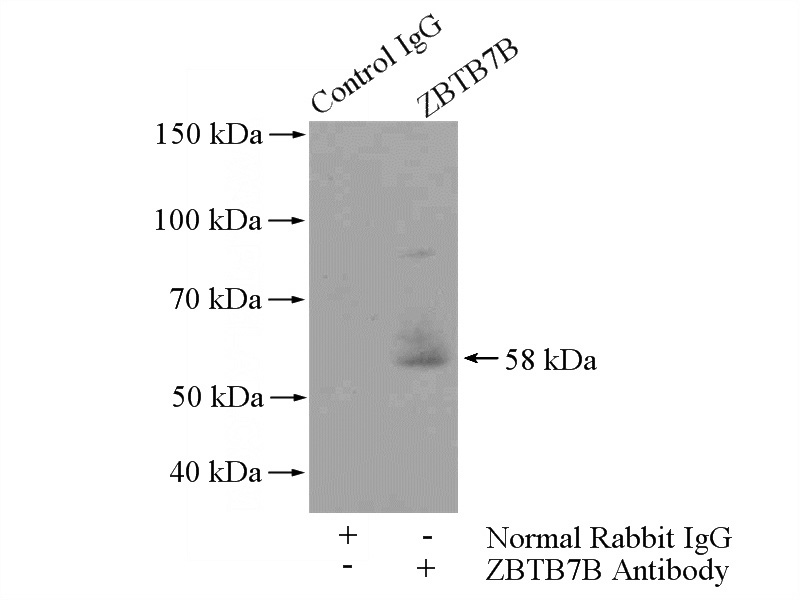-
Product Name
ZBTB7B antibody
- Documents
-
Description
ZBTB7B Rabbit Polyclonal antibody. Positive IP detected in mouse skin tissue. Positive WB detected in human skin tissue. Positive IF detected in Hela cells, MCF-7 cells. Observed molecular weight by Western-blot: 58kd
-
Tested applications
ELISA, WB, IF, IP
-
Species reactivity
Human,Mouse,Rat; other species not tested.
-
Alternative names
c Krox antibody; DKFZp686G01254 antibody; hcKrox antibody; THPOK antibody; ZBTB15 antibody; ZBTB7B antibody; Zfp 67 antibody; ZFP67 antibody; Zinc finger protein 67 homolog antibody; Zinc finger protein Th POK antibody; ZNF857B antibody
-
Isotype
Rabbit IgG
-
Preparation
This antibody was obtained by immunization of ZBTB7B recombinant protein (Accession Number: XM_047421863). Purification method: Antigen affinity purified.
-
Clonality
Polyclonal
-
Formulation
PBS with 0.1% sodium azide and 50% glycerol pH 7.3.
-
Storage instructions
Store at -20℃. DO NOT ALIQUOT
-
Applications
Recommended Dilution:
WB: 1:200-1:2000
IP: 1:200-1:1000
IF: 1:10-1:100
-
Validations

human skin tissue were subjected to SDS PAGE followed by western blot with Catalog No:116920(ZBTB7B antibody) at dilution of 1:400

Immunofluorescent analysis of Hela cells, using ZBTB7B antibody Catalog No:116920 at 1:25 dilution and Rhodamine-labeled goat anti-rabbit IgG (red).

IP Result of anti-ZBTB7B (IP:Catalog No:116920, 4ug; Detection:Catalog No:116920 1:300) with mouse skin tissue lysate 3200ug.
-
Background
ZBTB7B belongs to a large family of transcription factors, generally acting as repressors, characterized by a carboxy-terminal DNA binding domain made of multiple zinc fingers (four in Thpok) and an amino-terminal BTB-POZ domain that mediates homo- (and possibly hetero-) dimerization [PMID: 17084908]. Zbtb7b is up-regulated by MHC-II-restricted thymocytes during their CD4 differentiation and is a major determinant of CD4 lineage choice. Two properties of ZBTB7B deserve attention. First, although Thpok is expressed in a wide variety of cells, its expression in the thymus is highly lineage-specific: CD4 SP thymocytes (and all CD4 T cells) express Thpok, whereas DP and CD8 SP thymocytes do notSecond, both loss- and gain-of-function experiments indicate that Thpok affects lineage choice but not positive selection [PMID: 15729333, 10550051].
Related Products / Services
Please note: All products are "FOR RESEARCH USE ONLY AND ARE NOT INTENDED FOR DIAGNOSTIC OR THERAPEUTIC USE"
